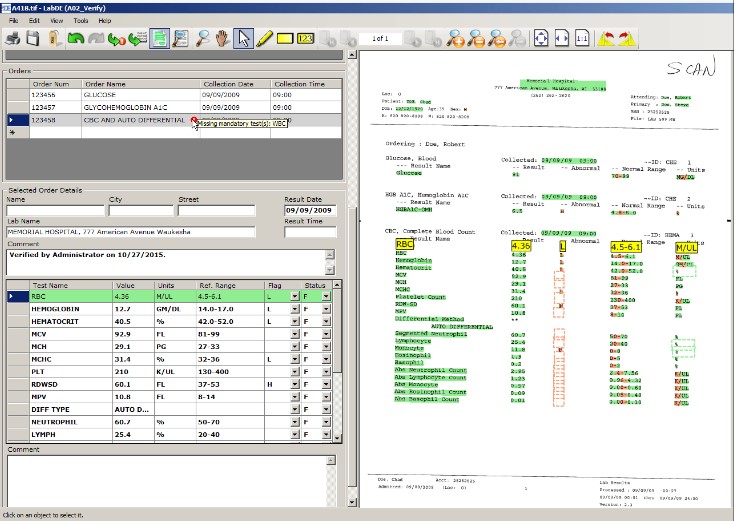A consultant who supports analytics for population health and quality of care recently told me that frequently, they can only access 80% or less of the total data needed for these initiatives.
Posted by Ellen Bzomowski on Dec 21, 2015 3:02:55 PM
Posted by Joseph Smith on Dec 18, 2015 9:54:52 AM
An ounce of prevention is worth a pound of cure. Or, reduce medical errors through better documentation. Which one of these expressions do we tend to remember? In healthcare we hear quite a bit of talk these days on reducing medical errors. Of course this is with good reason. When getting data into the EMR, errors such as inaccurate or delayed results, can negatively impact patient health and lead to extended hospital stays, unnecessary treatment or worse. As a matter of fact, many healthcare organizations are now striving to eliminate mistakes and streamline efficiencies by adopting principles such as Six Sigma and other business practices which are designed to continuously evaluate and improve best practices. One such axiom is the 1-10-100 rule from Total Quality Management.
Read MorePosted by Greg Gies on Dec 14, 2015 1:34:00 PM
Recently, Healthcare Informatics published an article, Considerations for Successful Clinical Data Abstraction.
As the author points out, when moving either from paper charts to EHRs or from legacy EMRs to EHRs, migrating clinically valuable data often involves manual abstraction. Read MorePosted by Greg Gies on Dec 10, 2015 6:42:00 PM
The Centers for Medicare & Medicaid Services regulates laboratory testing performed on humans in the U.S. through the Clinical Laboratory Improvement Amendments (CLIA) to ensure quality laboratory testing. CLIA sets high standards for quality control, validation of data and tests, equipment calibration, proper training and certification of users and clear end result reporting that meets proper lab data requirements.
Complying with CLIA requirements creates a necessary and significant impact on your human resources. When you receive orders on paper or electronically from performing labs outside of your area, you may already have the feeling of being continually challenged with every accredited organization's survey of your records. Your patients routinely generate paper or faxed (electronic) results from your outreach or ambulatory clinics that require human data transcription. You receive a variety of results values from a broad list of performing labs. You may feel that you have experienced and competent staff, but let’s be honest; nobody is a perfect typist.
Read MorePosted by Greg Gies on Dec 7, 2015 2:14:00 PM
Health data challenges are a part of any healthcare organization. Frustration is a natural consequence. This is also a common topic in most healthcare press lately. It often feels like depending on which way the wind is blowing, the consensus is that EMR adoption by clinicians is either improving or getting worse. A recent KLAS report indicates adoption is improving across the globe. The decision to move to an enterprise EMR for most organizations often includes as a factor the goal of reducing the total number of applications supported. Initiatives to improve adoption then becomes a challenge if your department's prized application is removed for something "less than robust". Along with pain and frustration, keeping your clinicians happy is also a  challenge.
challenge.
Posted by Greg Gies on Dec 2, 2015 1:45:12 PM
In my previous post about lab results interoperability, the sixth in a series of seven blog posts that discuss some misperceptions about lab interfaces and intelligent clinical data extraction software, I described a common misperception we encounter in our work with healthcare organizations. We are frequently told that the HIM department already has scanning, indexing and document management software for integrating paper / unstructured documents such as faxed lab results with the EMR.
Read MorePosted by Dr. John Daller, MD, PhD, FACS on Nov 30, 2015 5:24:47 PM
Tracking data in your transplant care software is a key component of QAPI programs, not only for CMS, but now also with UNOS debating the requirement of QAPI programs. One of the most challenging aspects of transplant program management is ensuring that your Quality Assessment and Process Improvement programs are measuring meaningful and actionable items that lead to program improvement.
Read MorePosted by Dr. John Daller, MD, PhD, FACS on Nov 23, 2015 5:27:21 PM
In our last post in this series, we talked about the challenges of getting ready for the selection committee meeting. As a transplant coordinator, the selection committee meeting is your opportunity to advocate for your patient that you have been nurturing from the initial evaluation until this upcoming meeting. Now that your patient has completed the pre-transplant evaluation which I covered in the first post in this series, the decision of whether or not to add them to the waiting list must be made.
During the listing meeting, medical information will be shared with members of the multi-disciplinary team, highlighting the key factors that the committee will consider in their decision.
Read MorePosted by Greg Gies on Nov 18, 2015 5:06:17 PM
A common concern expressed about automated clinical data extraction is “How can we be sure that the data going into the EHR is correct”?
Read MorePosted by Joseph Smith on Nov 16, 2015 4:38:34 PM
Healthcare Informatics recently published an article most of us can relate to—that if you want to remember something important, it helps to write it down. Information is only useful if available. According to the article, Research: Access to Docs’ Notes Increases Medication Aherence, researchers at Geisinger Health System found that patients who had access to their doctor’s notes demonstrated an improved adherence to a medication regimen.
Read More







